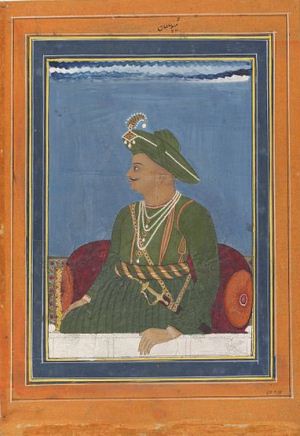 AM | @HDI1780
AM | @HDI1780"... on oublie aisément d'être juste" — Guillaume-Thomas Raynal
In the 1772 edition of Histoire des deux Indes, Raynal is of two minds as he describes the situation faced by the East India Company in Bengal. On the one hand, he frets about the unchecked power of the Company, which carries the obvious risk of corruption on a large-scale: "...on peut prédire qu'ils finiront par se corrompre". On the other hand, however, his admiration for the English system of equality before the law inspires this remarkable passage about the link between good governance, stable property rights, and the abundance of credit:
Il n'en est pas ainsi aux yeux des Anglois; leur plan est de lier si bien les mains au Souba, aux Nanabs, aux Rajas de sa jurisdiction, qu'ils ne puissent plus opprimer les peuples qui dépendent d'eux. Calicuta sera toujours un tribunal ouvert aux plaintes de tous les malheureux que la tirannie osera poursuivre. La propriété sera si respectée, que l'or enseveli depuis plusieurs siècles sortira des entrailles de la terre pour remplir sa destination. On encouragera tellement l'agriculture, les manufactures, que les objets d'exportation deviendront tous les jours plus considérables (HDI 1772, iii, pp. 380-381).
Eventually, the outrage caused by the depredations of the Company led the abbé to change his tune in subsequent editions of HDI. Semi-public European trading companies were now seen as embodying the evils of imperia in imperio [see]. In the 1780 edition, Diderot was given free rein to call for public riots in London against the East India Company. But let us give some credit to Raynal and to his early vision of developments in India. His timing may not have been perfect, but by the turn of the century, once the problem of imperium in imperio had been solved (i.e, once the Company was placed in a sharply subordinated position), the program he outlined in 1772 was largely in place.
* * *
This is apparent from documents relating to the role played by the Wellesley brothers after the fall of Seringapatam in mid-1799. According to biographer Rory Muir, Arthur Wellesley —named governor of Seringapatam after the city was taken— was quick to restore order,
...quelling the looting and mayhem by the execution of several soldiers and the flogging of others, caught by the provost in the act of committing their crimes [...]. And he continued to take vigorous measures to protect the civilian population from military abuses, publicly warning British officers that they had no more right to strike Indians than they had to strike Englishmen at home, and that if they did so they would be prosecuted. Nor was that an empty threat, for Wellesley had already ensured that an assistant-surgeon was court-martialed when complaints were received of his misconduct, and quashed an attempt by the court to minimise his offence [1].
Three officers of Wellesley's own company were court-martialled in a case of corruption involving military stores in Seringapatam. By Ocober 1799, Lord Mornington (Wellesley's elder brother, Governor-general of India) was proud to inform the Foreign Office that "public and private credit have improved to an astonishing degree, and are still progressively improving" (p. 131) [2]. In a dispatch written in January 1800, he explicitely links the downward path of interest rates to "the increasing confidence of the natives in the solid establishment, good faith, and just laws of the British government, as to raise public credit" (pp. 189-190).
Thus, 8%-securities trading at a five per cent discount were expected to reach par in the short run. Although Mornington's optimism needs to be taken with a grain of salt, his reports to the Foreign Office in 1799-1800 sound very much like a validation of Raynal's early analysis of English policy in India: "It may be expected that industry, population and manufacture, and all the sources of public and private credit will take a new spring in our possessions in the Peninsula of India, in consequence of our increased security in that quarter" (p. 229).
Thus, 8%-securities trading at a five per cent discount were expected to reach par in the short run. Although Mornington's optimism needs to be taken with a grain of salt, his reports to the Foreign Office in 1799-1800 sound very much like a validation of Raynal's early analysis of English policy in India: "It may be expected that industry, population and manufacture, and all the sources of public and private credit will take a new spring in our possessions in the Peninsula of India, in consequence of our increased security in that quarter" (p. 229).
[1] Rory Muir. Wellington. The Path to Victory, 1769-1814. Yale University Press, 2013, chapter seven [webiste] [lifeofwellington.co.uk]. "Wellesley also relished the chance to play lawmaker, preparing a lengthy series of regulations which established the mechanisms by which both Hindu and Muslim courts should operate in Seringapatan. Later, when Abbé Dubois sought the return of Christian women abduced by Tipu and forced against their will into the zenana [harem], Wellesley refused to intervene. He admitted that 'Justice and all our prejudices and passions are on the side of the Christians', but the government had taken Tipu's family under its protection".
[2] The Dispatches, Minutes and Correspondance of the Marquess Wellesley during his Administration in India, Vol. II. London: W. H. Allen & Co., 1836 [see].
_____________


